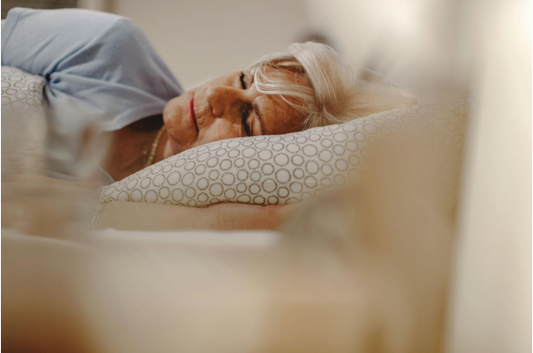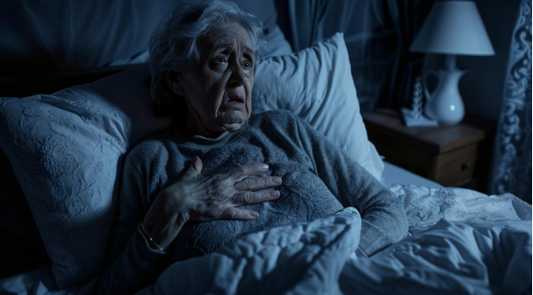Sleep is crucial for everyone, but it's especially important for seniors who often battle restlessness. Enter herbal teas, nature's calming elixir with the potential to transform restless nights into peaceful slumbers. Varieties like chamomile, lavender, and valerian root are touted for their sleep-promoting benefits, helping alleviate anxiety and encourage relaxation. Imagine winding down with a soothing cup of tea that not only warms your body but quiets your mind, paving the way for a restful night's sleep. For the elderly, these herbal infusions offer a gentle, natural remedy to sleep struggles without harsh side effects, turning bedtime into a serene ritual.
Understanding Sleep in the Elderly
As we age, our sleep patterns change. Older adults often find themselves tossing and turning more at night, waking up earlier and struggling to get the deep, restful sleep that so many of us take for granted. Have you ever wondered why this happens?
Understanding these alterations can reveal much about the importance of sleep in maintaining a healthy lifestyle as we grow older.
Common Sleep Disorders
Sleep issues are not just pesky nighttime disturbances; they can be telltale signs of underlying health conditions. Here's a closer look at some common sleep disorders affecting the elderly:
- Insomnia: Ever had nights where no matter how tired you are, sleep just won't come? Insomnia, characterized by difficulty falling or staying asleep, is common among older adults. It may be due to changes in sleep patterns, stress, or underlying medical conditions.
- Sleep Apnea: This disorder causes breathing to stop and start during sleep. It can lead to loud snoring and tiredness even after a full night's sleep. It's not just annoying – it's a potential hazard for heart health as well.
- Restless Leg Syndrome (RLS): If you've felt an uncontrollable urge to move your legs at night, often accompanied by uncomfortable sensations, you might have experienced RLS. This condition makes restful sleep seem impossible and can lead to daytime fatigue.
Each of these disorders disrupts the precious rest our bodies need. Recognizing them is the first step toward finding a solution.
Impact of Sleep Deprivation
We often hear about the importance of sleep, but what happens when the elderly don't get enough? The effects are not just about feeling sleepy during the day. They dive deeper into both physical and mental health:
- Physical Health: Lack of sleep can contribute to higher risks of heart disease, obesity, and diabetes. It can weaken the immune system, making it harder to fend off common ailments like colds or other infections.
- Mental Health: Sleep deprivation's impact on mental health is significant. It can exacerbate symptoms of anxiety and depression, lead to memory problems, and reduce overall cognitive function. Seniors might find it difficult to concentrate, solve problems, or enjoy everyday activities.
Aging might bring about changes in how we sleep, but that doesn't mean we should overlook the importance of good sleep health. By understanding these disorders and their impacts, we can better approach sleep quality for our elderly loved ones.
Benefits of Herbal Teas for Sleep
Herbal teas have been cherished for centuries for their soothing and calming properties. They are commonly used as a natural remedy to promote relaxation and improve sleep quality. But what makes these teas so special for sleep, particularly for the elderly? Let's explore some of the unique benefits of herbal teas that may make them a perfect bedtime companion.
Natural Ingredients
Herbal teas are packed with natural ingredients that are known for their sleep-inducing properties. Here's a quick rundown of some of these key players:
- Chamomile: Often called the bedtime tea, chamomile is rich in apigenin, an antioxidant that binds to certain receptors in your brain to promote sleepiness.
-
Valerian Root: This herbal root has been used since ancient times to combat insomnia. It may increase levels of a neurotransmitter called GABA, which helps calm the nervous system.
- Lavender: Known for its aromatic smell, lavender tea may help reduce anxiety, which often hinders sleep.
- Passionflower: This unique flower may increase GABA levels similarly to valerian root, helping to reduce stress and improve sleep quality.
These ingredients work like nature’s lullaby, gently encouraging your body and mind to relax and prepare for a restful night.
Reduced Caffeine Content
When it comes to catching some Z's, caffeine is not your friend. Unlike black, green, or oolong teas, herbal teas typically contain little to no caffeine. Why is this significant?
- Less Stimulation: Without caffeine, your body can naturally wind down, leading to a more restful sleep.
- Gentle Relaxation: The soothing effect of herbal teas, without the jolt of caffeine, creates a mellowing experience.
A mug of herbal tea before bed acts like a warm hug, allowing you to ease into dreamland without the jitters that caffeine might cause.
By understanding these benefits, it becomes clear why herbal teas have become a popular choice for those looking to improve their sleep, especially in the elderly. They’re a delightful and natural way to encourage a peaceful and rejuvenating night's rest.
Top Herbal Teas for Promoting Sleep in the Elderly
As we grow older, catching a good night's sleep can sometimes feel like chasing a wave. Herbal teas offer a natural way to aid sleep without the side effects of medications. Here are some herbal teas known to help you sail smoothly into dreamland, particularly for the elderly.
Chamomile Tea
Chamomile tea is like a warm hug in a cup. It's been used for centuries as a natural remedy for calming nerves and promoting sleep. But what makes it so effective? The magic lies in an antioxidant called apigenin, which binds to receptors in your brain, reducing insomnia and anxiety. Studies have shown that elderly adults who drink chamomile find it easier to fall asleep and stay asleep longer. So, sipping on chamomile tea before bed might just be the trick you need for a restful night.
Valerian Root Tea
Valerian root tea has been called nature's tranquilizer. It's another herbal powerhouse that helps improve sleep quality without making you feel groggy. The reason? It increases the levels of a neurotransmitter known as GABA in your brain, which plays a big role in relaxation. Research shows that this tea can reduce the time it takes to fall asleep and improve sleep quality, especially helpful for older adults who struggle with restlessness at night.
Lemon Balm Tea
If you've ever felt anxious when trying to fall asleep, lemon balm tea might be your nighttime hero. This herb has a mild lemon scent and acts as a soothing balm for the mind. It’s known for easing symptoms of insomnia and reducing anxiety. For elderly individuals, lemon balm tea helps in calming the nervous system, making it easier to slip into a peaceful slumber.
Lavender Tea
Lavender tea isn’t just about its heavenly fragrance; it's also about tranquility in a teacup. This tea is often used in aromatherapy because of its calming effects. Drinking lavender tea is known to reduce anxiety and improve sleep quality. Imagine curling up with a soft blanket and the gentle aroma of lavender wafting through the air – it's a surefire way to prepare your mind and body for rest.
Passionflower Tea
Passionflower tea might sound exotic, but it’s a simple yet powerful choice for those who need a bit of help relaxing. It contains flavonoids that bind to receptors in your brain, similar to benzodiazepines, providing a natural way to lower anxiety and promote restful sleep. Many elderly folks find that passionflower tea not only helps them fall asleep faster but also reduces night awakenings, leading to a more profound, rejuvenating rest.
Explore these herbal options, and you might just find the key to unlocking tranquil nights and energetic days. So why not brew up a cup and see what works for you?
How to Prepare Herbal Teas for Maximum Benefit
Preparing herbal tea is an art, much like crafting a cherished piece of pottery. The taste, aroma, and benefits of herbal tea significantly depend on how it's prepared. Whether you're sipping it to unwind or seeking health benefits, such as promoting sleep, getting the preparation right can make all the difference.
Optimal Brewing Techniques
The first step in preparing any herbal tea is understanding the ingredients and how they respond to heat. Here's what to consider for the best results:
- Water Temperature: The temperature should be just right—not too hot, not too cool. Most herbal teas require water at about 200°F (93°C). That's just before it boils. Heat can alter the essential oils and nutrients in herbs, so getting it right is crucial.
- Steeping Time: Steeping is the process of soaking herbs in hot water to extract their flavor and benefits. Here's a simple guide:
- Leaves & Flowers: 5-10 minutes
- Roots & Barks: 15-20 minutes
- Seeds: 10-15 minutes
-
Steeping for the right time ensures you extract all the goodness without making your tea bitter or too strong.
- Quantity of Herbs: Generally, use about 1-2 teaspoons of dried herbs per cup of water. If you're using fresh herbs, you may need to double the amount since they are less concentrated.
Tools like a french press or tea infuser can make this process simple and effective. Remember, steeping herbal teas is a gentle affair—let your herbs unfold and release their magic at their own pace.
When to Drink Herbal Teas
Timing is everything. Drinking herbal tea at the right moment can enhance its impact, especially for those who are looking to improve sleep quality. Here are some tips:
- Evening Ritual: Herbal teas, particularly those like chamomile, passionflower, or valerian root, are best consumed about 30-60 minutes before bedtime. This allows your body time to absorb their calming effects, setting the stage for restful sleep.
- Empty Stomach: Drinking herbal tea on an empty stomach can improve absorption, ensuring you get the full potency of the herbs.
- Consistency: Like any natural remedy, consistency is key. Try to incorporate herbal tea into your nightly routine to see long-term benefits.
Consider the tea as a part of your relaxation routine. You might light a candle, put on some calming music, and let each sip help you unwind.
By following these techniques and timing guidelines, you’re well on your way to sipping your way to better health and more restful nights. Remember, the right cup of tea can be not just a beverage but a soothing ritual.
Conclusion
The exploration of herbal teas like chamomile, lavender, and valerian root unveils their profound benefits for sleep in the elderly. These natural remedies can ease anxiety, enhance relaxation, and facilitate restful slumber. By incorporating these teas into a nighttime routine, older adults may find a path to improved sleep quality.
Consider making a soothing cup of herbal tea a nightly ritual.
It's a simple yet effective step towards better sleep and overall well-being. What's your favorite bedtime tea? Curious minds want to know—share below!
P.S.
If you are having difficulty with sleeping, you are not alone. There are many folks out there who want to know what the most effective natural sleep aid is to get them back to snoozing again. Fix My Sleep is a great resource for all those who have trouble sleeping and are looking for innovative tips and sleep products to help them get a good night’s sleep.





